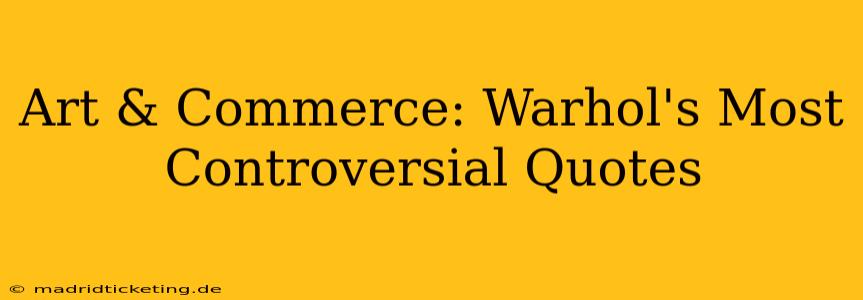Andy Warhol, the undisputed king of Pop Art, remains a captivating and controversial figure decades after his death. His art, a vibrant reflection of consumerism and celebrity culture, is as celebrated as it is debated. But it's his pronouncements on art, life, and the intersection of the two that continue to spark discussion and controversy. This exploration delves into some of Warhol's most provocative quotes, examining their context and lasting impact. We'll unpack their meaning and consider why they remain so relevant today.
"In the future, everyone will be world-famous for 15 minutes."
This perhaps Warhol's most famous quote, encapsulates his prescient understanding of the media's power to create and destroy celebrity. It speaks to the fleeting nature of fame in a world increasingly saturated with information and images. While seemingly cynical, the quote also hints at the democratizing potential of media, where anyone, for a brief moment, could achieve a level of notoriety. But the "15 minutes" is a double-edged sword; it suggests that true lasting impact requires more than a viral moment. The quote’s enduring relevance is evident in our current social media landscape, where fleeting fame is commonplace. Many argue that the internet, with its endless scroll of content, has amplified and shortened Warhol's 15 minutes.
Was Warhol right about the fleeting nature of fame in the digital age?
The pervasiveness of social media has undeniably accelerated the cycle of fame. While platforms offer opportunities for quick notoriety, maintaining relevance is a constant battle against the algorithm. Viral moments are easily eclipsed by the next trending topic. However, the digital realm also allows for the cultivation of niche communities and long-term engagement, a concept perhaps not fully envisioned in Warhol's time. The quote's enduring power lies in its ability to prompt ongoing reflection on the nature of fame in a rapidly changing world.
"Making money is art and working is art and good business is the best art."
This statement is arguably Warhol’s most controversial, revealing his pragmatic approach to art and its commercial viability. He didn't shy away from the capitalist system, integrating it directly into his art and life. The quote challenges the traditional notion of art as a purely idealistic pursuit, separated from commercial considerations. For Warhol, the act of creating and selling art was a unified process, a shrewd business venture intertwined with artistic expression. This perspective, viewed by some as crass commercialism, by others as a revolutionary acknowledgment of art's role within society.
Did Warhol truly believe art and commerce were inseparable?
Warhol's life and career serve as evidence of his belief in the intertwining of art and commerce. His business acumen was as sharp as his artistic vision. The Factory, his studio and social hub, was a highly efficient production line churning out art, films, and events. He actively cultivated relationships with galleries and collectors, skillfully positioning himself within the art market. His embrace of commerce wasn't solely about profit; it was a statement about art's place in a consumerist society.
"An artist is somebody who produces things that people don't need to have."
This quote, seemingly contradictory to his business-minded approach, highlights the inherent tension between art's practical value and its emotional and intellectual impact. Warhol underscores art's non-essential nature, its existence outside the realm of necessity. Art, in this context, is a luxury, a source of aesthetic pleasure and creative expression that exists beyond immediate functional needs. This distinction further underscores Warhol's unique perspective on the artist's role.
Does this contradict his other statements about art and commerce?
This quote doesn't necessarily contradict Warhol's other views; rather, it provides a crucial counterpoint. While he saw commercial success as integral to the art world, he also acknowledged its non-utilitarian essence. Art's lack of necessity, he implies, is precisely what makes it valuable—it provides something beyond the purely functional, enriching life in ways that essential goods simply can't. The quote reveals a nuanced understanding of art's multifaceted nature.
Conclusion
Warhol's controversial quotes continue to resonate because they force us to confront complex questions about the nature of art, fame, and commerce. He was a master provocateur, challenging established norms and forcing a re-evaluation of artistic values in the context of a rapidly changing world. His legacy extends beyond his iconic artwork; it's found in his insightful, often challenging, observations on the human condition and the role of art within it. His words remain a source of debate, interpretation, and continuous relevance in our ever-evolving society.

